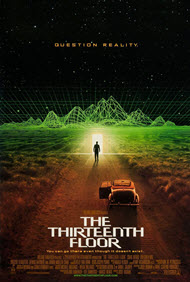The 13th Floor
Reviewed by: Brian A. Gross
CONTRIBUTOR
| Moral Rating: | Very Offensive |
| Moviemaking Quality: |
|
| Primary Audience: | Adults |
| Genre: | Sci-Fi Mystery Thriller |
| Length: | 1 hr. 40 min. |
| Year of Release: | 1999 |
| USA Release: | May 28, 1999 |
| USA Release: |
| Featuring |
|---|
| Craig Bierko, Armin Mueller-Stahl, Dennis Haysbert, Gretchen Mol, Vincent D'Onofrio |
| Director |
|
Josef Rusnak |
| Producer |
| Distributor |
“Question reality. You can go there even though it doesn’t exist.”
The press push for Josef Rusnak’s debut film, “The 13th Floor”, was an expansive one by Columbia Pictures. The technical CAD-like stills and elaborate cinematography of the teasers were compelling, but the movie lacked the substance to sustain it.
Encroaching and literally borrowing from “The Matrix,” “The 13th Floor” is a noire futuristic mystery based on time travel and computer technology. As in so many of these films I can’t tell if the director/writers are telling us that computers are bad, warning us of technology’s effects, or just showing sheer incompetence with stories and actors. Douglas Hall (Craig Bierko) is the young executive of a company that specializes in advanced Artificial Intelligence modules. He and his mentor/partner, Hannon (Armin Mueller-Stahl), have created a fully realized simulation of 1937 Los Angeles that users can be transported to with absolutely lifelike characters. When Hannon turns up dead from a brutal knifing, Douglas is thought to be suspect #1 when his alibi doesn’t work out. Borrowing another page from “Dark City,” it uses the role of detective (Dennis Haysbert) to drive the story and delve into the truth.
Hannon’s daughter, Jane (Gretchen Mol), arrives after his death—to the great surprise of everyone since she was never mentioned—and claims that her father has asked her to visit just days before to shut the company down. Apparently Hannon was taking trips into the simulation, with the help of their crack tech, Whitney (Vincent D'Onofrio), and gallivanting with young lovelies and generally acting like a cad. Before Hannon’s untimely death he left a message on Doug’s answering machine explaining that he left a clue for him in the simulation. Doug immediately heads to the lab to be transported.
What he finds in the alternate world is an incredible realization of their dreams, and the reality that the models they created are all too real. They feel jealousy and anger and lust and create havoc for their creators. But what is real? Can you die in the simulation, and, if so, do you die in real life?
It is a symptom of post modernism that exalts the subjective over the objective. God is dead and there is no truth so reality mixed with technology is a confused and precarious game. “The Matrix” asked, “what is real?” and “The 13th Floor” plumbs the same depths. How do we know anything is real? What is grounded in reality (and is there any grounding to be had with amorphous modes of reality)? What are the boundaries that we can go to as humans with only flimsy ethics to hold us together?
Those are questions of life that reflect in film, but not in this particular film. It only quantifies the mystery and level of the ruse and throws a nice twist in the end to let us go home not feeling so down.


PLEASE share your observations and insights to be posted here.



